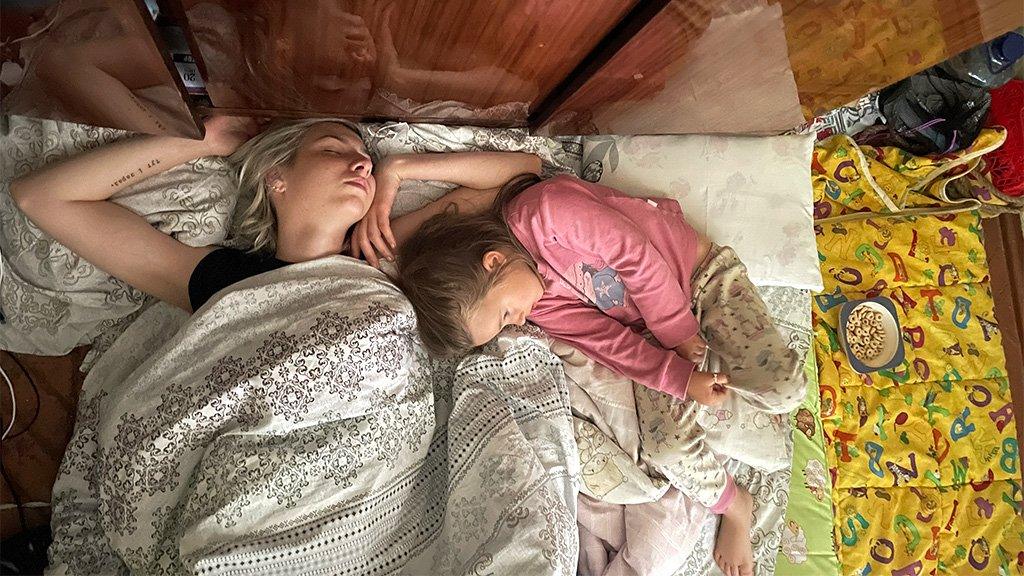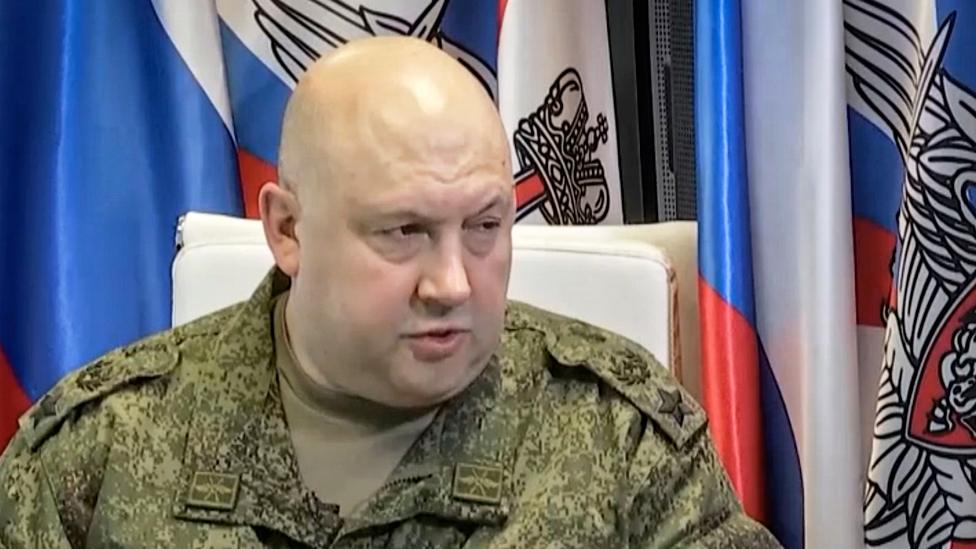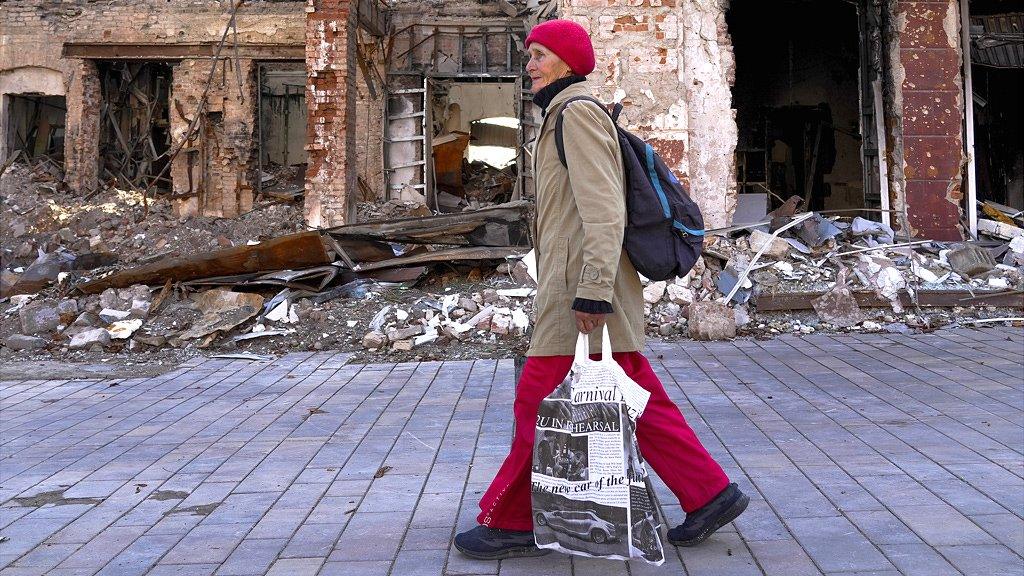Ukraine war: We secretly filmed our lives in occupied Kherson
- Published

As Russia scrambles to pull its civilian staff out of the city of Kherson ahead of a Ukrainian counter-offensive, Ukrainian father Dmytro Bahnenko reflects on the months he and his family lived there under occupation and secretly filmed for BBC Eye at great personal risk.
"I saw a robot today," my five-year-old daughter Ksusha whispered to me as I filmed her underneath the table.
"It was flying… it wanted to kill me."
It wasn't clear what - if anything - Ksusha had seen that day to evoke the disturbing image. But evidently she was unsettled.
Nothing had been the same since Russian soldiers first marched past our window in the late afternoon of 1 March, and I began filming our lives for a BBC Eye documentary. My day job had been as a local reporter. Never did I think I would be filming an invasion of my home city - the only Ukrainian regional capital to have been captured.
Russian troops entering Kherson, filmed from Dmytro's window
How we shielded Ksusha from the brutality of Russia's invasion, and we ourselves remained sane, became central to our lives, as my wife Lidia and I grappled with our new reality.
In the first few days our city seemed frozen - I filmed the emptiness as schools stood closed, government buildings abandoned, and factories and offices empty. Most people laid low.
The Russian forces, having taken Kherson, were now trying to advance on nearby Mykolaiv, and were shelling ferociously. We dragged our mattresses into the corridor - away from the windows - and made up games to distract Ksusha. I became an expert in making shadow puppets, with spiders becoming my speciality. Lidia and I would whistle birdsong to try to drown out the noise as Ksusha fell asleep.
The irony is that for decades Ukraine helped feed the world, but in those first few days we were struggling to get hold of the most basic items.
"I managed to get the last potatoes," one man told me wearily as I was filming in the city centre one day in early March. It was not yet nine in the morning.
But the people of Kherson seemed anything but resigned to their fate. Protests against the occupation began early and grew in ferocity over the following few weeks. The Russian troops appeared shocked - in their minds they had arrived as "liberators".
'I don't want them to shoot bombs at me'
I began to cycle to an Orthodox church where the local community gathered and from where I could help others with practical tasks. I got to know its charismatic priest, Father Serhiy Chudynovych. He seemed to have a particular energy, dashing from one project to another. He was running a community centre, cafe and mobile hairdresser, and perhaps most importantly, risking his life by crossing military lines to collect medicine no longer available in Kherson.
"It is scary when you're driving and you're shot at - you need to get away fast," he told me.
This rhythm of relative calm, peppered with moments of extreme jeopardy, became the cadence of our lives.
And even the periods of calm were gradually becoming more tense.
Back across town, two weeks after Russian troops first marched into Kherson, Father Serhiy made the decision to hold a public funeral for a Ukrainian soldier killed in the fighting, and to livestream it for those who couldn't attend.
It was not without risk. Father Serhiy acknowledged that honouring a dead Ukrainian soldier could be seen as a provocation by the Russian military.
Meanwhile, the protests against the occupation continued, and on 21 March, the mood changed. The Russian military began spraying tear gas and lobbing stun grenades. Many people were injured. This was followed by a wider crackdown. Increasing numbers of people were disappearing - activists, those with links to Ukrainian authorities, journalists.
Russian forces turn on protesters in Kherson
Some people were taken during protests, some from their homes. Some were released, some never came back.
I feared that I would be next. How long before they found my messages in a phone belonging to one of those detained? Or would I be stopped and searched, and my videos discovered?
The following night, we gathered with my pregnant sister Maryna and her husband Vitaly in the home Maryna and I had shared with our parents when we were growing up. There - at the kitchen table where we had eaten our breakfast as children - we discussed the war.
Maryna was checking the prices drivers were charging to get people out of town. They started at $1,500 [£1,300] just to cross the front line and travel the short distance to Mykolaiv. Unaffordable, but they were beginning to feel desperate. Maryna did not want to give birth under occupation. And it was no longer safe for Vitaly to go to work. He managed a private luxury estate - hotel, stables and a small zoo - out of town, which meant navigating several tense checkpoints every day.
On 30 March, I again cycled to Father Serhiy's church. But when I arrived, I discovered that he, too, had been taken away by Russian authorities. I quickly deleted all his messages to me, and waited nervously for news.
That night he posted on social media that he had been released unharmed, but my subsequent visits to his church suggested a man changed - he appeared tired and distracted.
Over the weeks, he became increasingly distant from me and others who visited him. He no longer even went to church. When I called him he told me everything was fine.
But towards the end of April he again posted on social media. He revealed not only that he had escaped Kherson, but that he had lied in his original post. He says unidentified Russian men forced him to kneel, gripped his head between their knees, and threatened to rape him. Under duress he agreed to become a collaborator.
"To be honest, I'm ashamed," he said in his post.

Dmytro Bahnenk spent three months secretly recording his city's resistance to the Russian occupation. In an extraordinary film for BBC Eye, Dmytro chronicles the harsh reality of life under occupation, as food and medicines become scarce, people flee, and others begin to disappear.

We began to feel increasingly scrutinised from all directions. Wanting to rebel, Lidia and I celebrated our anniversary by breaking into an abandoned hotel, where we took photos of each other and ate Georgian takeaway food.
We climbed up to the roof and looked around. We now saw our city in a strange new light. Even the most innocuous details seemed sinister.
The Russian forces had stepped up their campaign to rid Kherson of its Ukrainian identity. Ukrainian flags and symbols were removed, monuments to our heroes destroyed.
On 6 May, a senior Russian politician Andrey Turchak visited the city and announced: "Russia is here forever. There should be no doubt of this. There'll be no going back."
It was all a build-up to the 9 May celebration of the Red Army's victory over Nazi Germany. I filmed ordinary people in Kherson openly showing their support for the Russians by wearing St George ribbons - emblematic of Russian military triumph.
Within our family, the pressure was also building. My brother-in-law Vitaly had been visited by the Russian Federal Security Service (FSB). He told me that one of the men handed him a hand grenade, pulled out the pin and walked away. When he returned he said laughingly that it was "just a joke".
Another FSB officer told Vitaly to report with documentation so he and Maryna could be relocated to Crimea. They did not, of course, want to move to Russian-held Crimea.
This incident brought home the fragility of the situation for all of us.
Maryna and Vitaly packed up and prepared to leave the next day, and we realised it now made sense for us to leave with them.
Dmytro and his family escape Kherson
We packed frantically. We wrote information about Ksusha, including who her guardians would be if we didn't survive, on a piece of paper which we hid in her library card holder. We hung it around her neck.
We sped out in convoy with my sister, nervously navigating one jittery checkpoint after another - uncomfortably close to the front line. And then, after 34 checkpoints, we spotted a Ukrainian flag. The same colours as the fields of yellow rapeseed and blue skies we were now driving through. The colours of freedom.
Five months on, the family are living in Kyiv. Dmytro's sister Maryna gave birth to a baby boy.
Related topics
- Published19 October 2022

- Published3 October 2022
